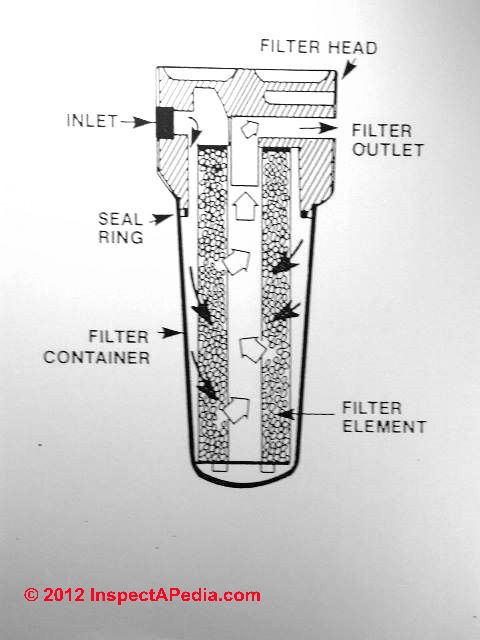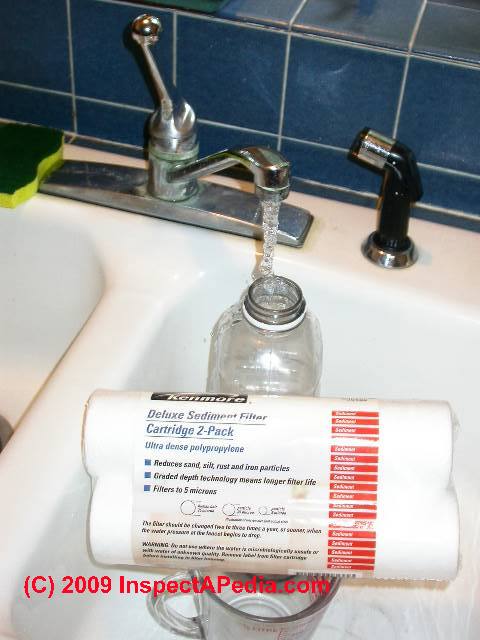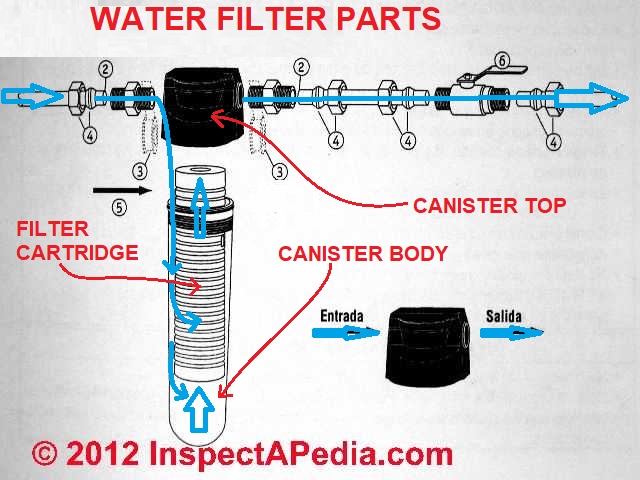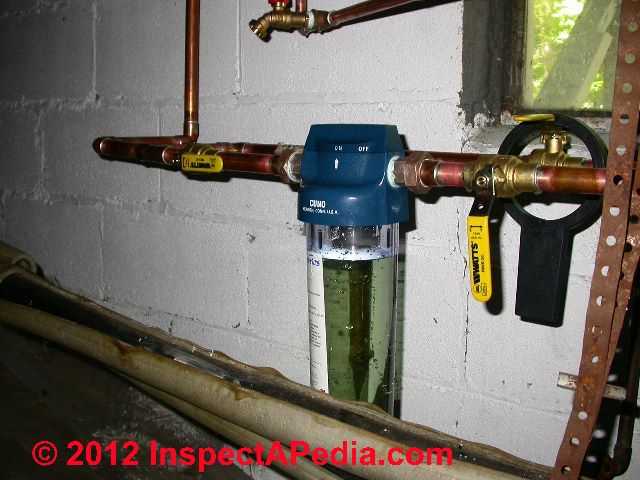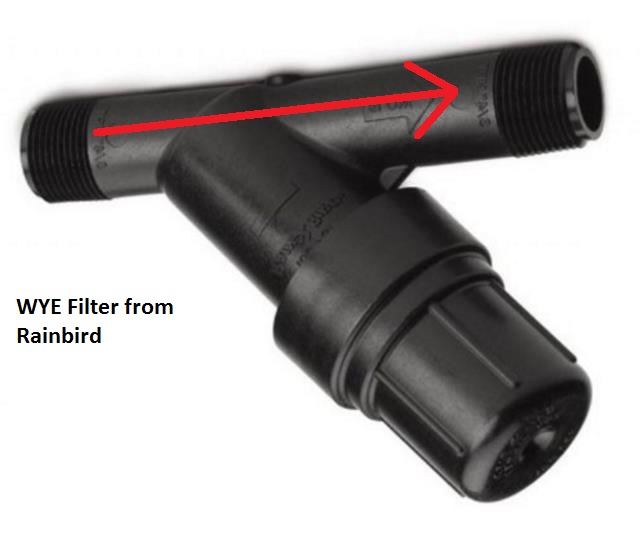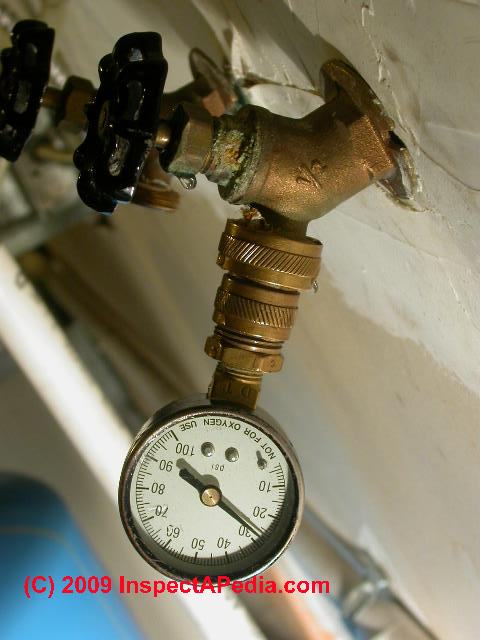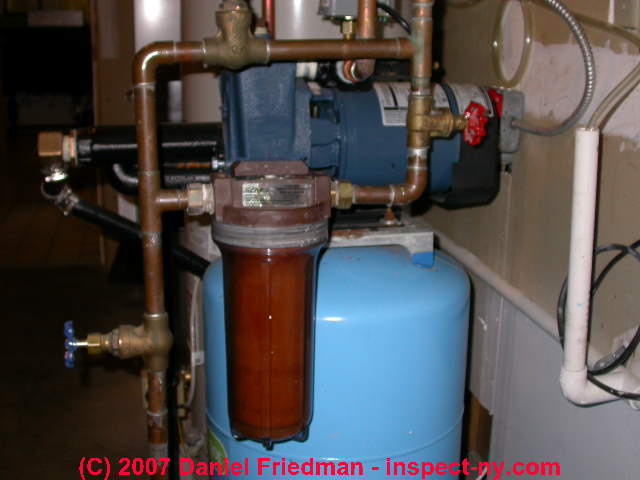 Home Water Filter Guide
Home Water Filter Guide
What is the best water filter for home use?
- POST a QUESTION or COMMENT about choosing and using all types of portable or installed water filters
Water filters for home use: types, uses, installation, warnings, sources.
This article describes different types water filters used for drinking water purification both as portable filters and where installed on building water supply systems, including both municipal water supplies and private well water systems.
The filters described here are usually intended to improve aesthetic issues in home water supply such as removing debris particles, sediment or odors.
InspectAPedia tolerates no conflicts of interest. We have no relationship with advertisers, products, or services discussed at this website.
- Daniel Friedman, Publisher/Editor/Author - See WHO ARE WE?
Choosing a Filter for Drinking Water Treatment

[Click to enlarge any image]
Four Types of Water Filters for Home Use
- Countertop water filters connected to the sink faucet through a hose or tube
- Faucet-mounted water filters are mounted directly to the outlet or spout of a faucet and direct water through a small filter cartridge.
- Plumbed-in or "connected" water filters are installed below the sink at the point of use (a kitchenor bath). Water is directed through the filter and then to a separate "filtered" water tap provided on the sink top.
- Pour-through water filters typically use a filter that provides a filter through which water is poured and then dripped into the pitcher from which water is poured into a glass or container for consumption
Following the "best filter" introduction just below we describe each of the types of drinking water filters intended for in-home or in-building installation & use.
What is the "Best" Water Filter for Home Water Supply Systems?
Water filters remove contaminants through one of these principal means
The first two methods listed below are discussed in this article. The third method, RO, is discussed in a separate article.
- Filtration
traps physical particles (such as sediment) on the filter surface or in its interior depending on the filter design. Some filters such as ceramic water filters are capable of removing extremely small particles and contaminants while others remove only larger particles such as sediment. Select the proper filter for the target contaminant to be removed.
Also see CERAMIC FILTERS for WATER DISINFECTION - Absorption:
some water contaminants such as metals or chemicals may be absorbed in the filter body (such as charcoal or similar media). - Reverse osmosis:
is a special type of filtration during which water pressure forces water molecules through a membrane leaving contaminants on the outside where they are flushed away as wastewater.
See REVERSE OSMOSIS WATER TREATMENT for details.
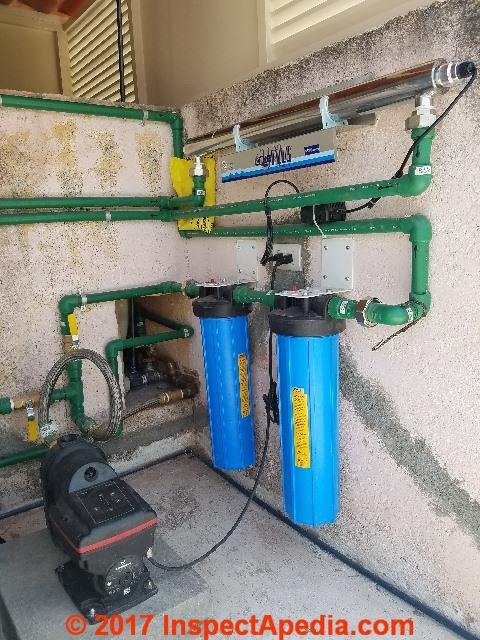 There is not a single "best" water filter for home use if you consider that what makes sense is to choose a water filter based on what contaminants you want to remove from the water.
There is not a single "best" water filter for home use if you consider that what makes sense is to choose a water filter based on what contaminants you want to remove from the water.
Separately at WATER TREATMENT EQUIPMENT CHOICES we list water disinfection methods such as chlorination or UV treatment intended to address just biological contaminants. Water disinfection does not remove chemical nor particulate contaminants.
Our photo shows a pair of blue Model 12-SS Vertex-brand whole-house water filter canisters installed at a building in San Miguel de Allended, Guanajuato, Mexico. These are designed to contain nominally 4 5/8" x 20" filter cartridges (Full Flow and BB).
The first filter (towards left in the photograph) is a Flow-Pro melt-blown filter cartridge # FPMB-BB20-20 sediment filter. These filter cartridges are nominally 20" x 4 1/2" in size.
The second filter in this series is a Watts® activated carbon block filter cartridge # WCBFF20. This is a 100% coconut shell carbon filter rated at 5microns and intended to remove odors and tastes from drinking water including high levels of chlorine. Instructions for using this charcoal filter include:
Prior to use, place in filter housing and flush 1-2 minutes to remove carbon fines. Do not use with water that is microbiologically unsafe or of unknown water quality without adquate disinfection before or after the system.
Take another look at our photo from the San Miguel de Allende water filter installation. Above this pair of water filters and "downstream" from them is a UV light disinfection system. The filters protect the light from blockage by sediment. Not shown is a water softener that is installed ahead of all of this treatment equipment.
Also see WATER QUALITY & QUANTITY San Miguel de Allende
- Charcoal filters:
activated charcoal filters are great at removing residual chlorine and odors in drinking water and can also remove sediment and even some pathogens.
The U.S. NRDC points out that some activated charcoal filters complying with U.S. Standard-53-Water Filter Certification can remove heavy metals such as copper, lead, mercury, chlorine or other disinfectant byproducts, parasites like Giardia or Cryptosporidium, pesticides, radon, VOCs, and certain other chemicals such as dichlorobenzene and trichloroethylene (TCE).
The U.S. EPA notes that solid-block charcoal filters can remove a wide range of water contaminants including
- bacteria
- chemicals
- heavy metals
- nitrates and nitrites
- parasites
- and with an additional filter step, fluoride
Watch out: Charcoal can also serve as a pathogen growth media, and these filters can clog rapidly if the water supply is high in sediments. For this reason you'd place a charcoal filter, if needed, downstream from the sediment filter and downstream from a UV light or other disinfection system.
Watch out: if not properly selected, and if not changed or renewed on schedule any filter including charcoal filters can convert from being effective at reducing or removing water contaminants to harboring them and even dispensing them into the water supply.
Details are at
Watch out: the sediment filter and charcoal filter canisters described above will not remove certain inorganic contaminants that might be found in the water supply, including municipal water supply from some communities such as in San Miguel de Allende where there may be seasonal spikes of levels of arsenic or fluorides in the water supply.
Additional treatment such as by reverse osmosis or other arsenic/fluoride removal systems
See WATER QUALITY & QUANTITY San Miguel de Allende for more information.
- Reverse osmosis:
is a type of water filtration using a permeable membrane that can remove a very large range of contaminants, though these systems also waste water in the process.
Typically we'd precede an R.O. system with a sediment filter to first remove large particulates and/or a charcoal filter to remove odors & residual chlorine.
See REVERSE OSMOSIS WATER TREATMENT
Sediment filters: visible particles in the water supply are not only unpleasant but as we warned above, they can interfere with removal of pathogens from the water supply. For this reason it makes sense to place a sediment filter ahead of any other water treatment equipment in the building. The size of a whole house sediment filter that you require depends on the water usage rate and the level of sediment in the supply.
Also see DRINKING WATER FILTERS
Pros/Cons: Advantages and Problems with Various Types of Water Treatment Equipment for Bacterial or Bacteriological Contamination
- WATER FILTERS as Purifiers (introduction)
and FILTERS for DRINKING WATER PURIFICATION (details including portable ceramic water filters, silver ceramic filters, magnetic (bogus) water purifiers, paper and polypropylene water filters, etc. ) - UV ULTRAVIOLET LIGHT WATER TREATMENT as a Water Purifier
- REVERSE OSMOSIS WATER TREATMENT Systems for Water Purification
- CHLORINATORS & CHARCOAL FILTERS for Water Purification
- WATER FILTERS - SEDIMENT & IRON and treatment systems: sediment, iron, odors, taste and iron or manganese filters to reduce red iron stains on fixtures & clothings
- WATER SOFTENERS & CONDITIONERS for correcting "hard" water - clogs pipes, poor washing & bathing, mineral deposits, reduced hot water output from water heaters and tankless coils
- WATER ODOR TREATMENTS, CURES - SULPHUR filters or Sulphur Treatment Systems - get rid of that "rotten egg" smell
- WATER TREATMENT CHEMICAL SAFETY Warnings
- ODORS in WATER - TYPES, CAUSES how to identify the source and cure the cause of odors in water
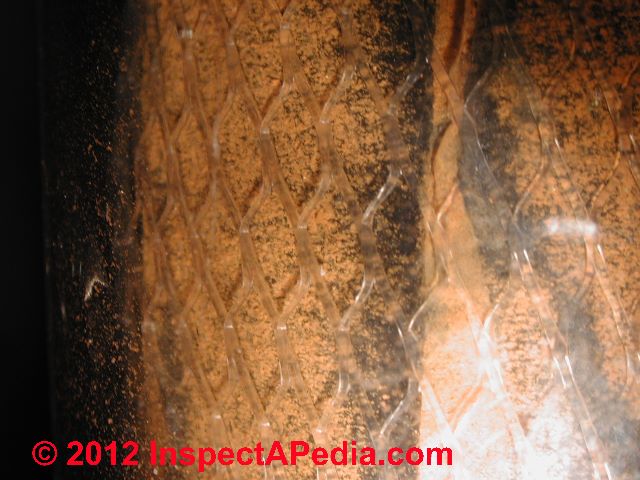
- A clogged water filter can block water flow between a pump and water tank or between a water tank and
the rest of the building.
It's a little tough to know for sure that a water filter cartridge has become clogged (photo at left) but as we explain next, a clogged filter might be detected by the problems it causes:- reduced water pressure/flow at fixtures
- well pump short cycling on and off
Try changing the water filter by installing a new cartridge; temporary diagnosis can be made by simply removing a suspect water filter cartridge from its canister entirely, or by placing the water filter system temporarily on "bypass".
- A clogged
water filter can cause water pump short cycling, with a rapid "on-off" pump cycle (which is bad for the pump and
pump relay switch.) See WATER PUMP SHORT CYCLING for details.
If this is your situation try first changing out the water filter for a clean one.
Technical note: the same clay, silt, or other debris that clogs a water filter
can clog up the pressure sensing opening in the bottom of a pump pressure control switch, as we discussed just above.
So if you are looking for a clogged filter, if changing
the water filter does not correct a problem with the water pump cycling operation, also consider a possibly-clogged pump pressure switch.
The sketch at left shows the basic parts and functions of a typical cartridge-type water filter.
Detailed descriptions of other water system parts and controls, valves, switches, pumps, piping, etc. are provided in the various sections of this article and are listed just below. [click the image at left to see an enlarged schematic of the water filter and its parts.]
Types of Drinking Water Filters
Cartridge Type Water Filters
Water is passed through a filter cartridge that is usually contained in a plastic or metal canister. Both portable and permanently-installed water filters are widely available and form the most common water filter system found in residential installations where sediment, odors, or chlorine residue are a concern.
The sketch at left illustrates the water filter element and the path of water passing through it.
- Sediment water filters
remove dirt or debris. Very fine clay debris may pass through some sediment filters, requiring more sophisticated water treatment. A sediment filter or a granular or activated charcoal odor filter will improve the aesthetics of a water supply but it does not disinfect water contaminated with bacteria. - Iron removing water filters -
are intended to reduce the level of iron in a water supply. Many sediment filters are also capable of removing iron from drinking water. Details are
at FILTERS - SEDIMENT & IRON . - Lead removing water filters
Watch out: also for lead removal systems that cannot handle high levels of lead that may be present in some water supplies such as the Flint Michigan drinking water lead contamination problem widely reported in 2015 and 2016. Typical household lead filters may not be adequate for water with high lead levels and drinking water processed through such filters mayu be unsafe.
Also see LEAD IN DRINKING WATER, HOW to REDUCE - Odor water filters & charcoal water filters
typically constructed using activated charcoal, will remove odors, a limited amount of some chemicals, and may trap some bacteria but these are not water purifiers. Activated charcoal filters are a principal method used to remove general and specific organics from the drinking water supply.[1]
A typical residential water treatment system handling water that contains bacteria will combine a chlorinator with a charcoal filter. the chlorinator treats the bacterial contamination and the charcoal filter post-processes the water to remove objectionable levels of chlorine.
See CHLORINATORS & CHARCOAL FILTERS
and also
see FILTERS - SULPHUR ODOR . - Bacteriostatic water filters -
constructed using activated charcoal combined with silver that is released in ion form to help control bacterial growth in the filter - Ceramic water filters/purifiers -
use a ceramic cartridge through which water is filtered. Ceramic filters can remove bacteria, sediment, and often odors and other contaminants.
Watch out: most conventional cartridge-type water "filters" such as the filter cartridges shown at left are not water purifiers. Only a filter that is certified to remove adequate levels of bacterial contamination are permitted to be sold as water "purifiers". Typically a filter that functions as a water purifier will be a ceramic device.
Ceramic water filter-purifiers, including hand-held portable units capable of removing bacteria, cysts, cryptosporidium, sediment, and other water contaminants are discussed in detail
at CERAMIC FILTERS & Water Purification .
We recommend that you review independent water filter performance or water purifier performance test reports before relying on a water filter/purifier for the production of safe drinking water.
Watch out: the functions performed by any cartridge type water filter depend on the material from which the cartridge is made. And many home water filter canisters will accept a variety of filter cartridge types intended for varying purposes.
Be sure to read the properties of the filter cartridge you are buying and select a filter cartridge type that performs the functions required. For example a water filter designed to reduce sediment may work well for that purpose but may be ineffective at removing odors.
And unless it is protected by a pre-filter or other means, a charcoal based water filter, good at removing odors, may become quickly clogged if it is used on a water supply high in sediment, or it may become contaminated if it is used on a water supply high in harmful bacteria.
For these reasons you may find a cascade of types of water filters on some home water supply systems. Typically water will be treated to kill or remove bacteria, filtered for sediment, and finally, filtered for odors or taste.
Types of Water Filter Media: What Media for What Purpose?
This list giving the typical water filtration media selection based on the contaminant being addressed is adapted from information provided by Duff Co., a Norristown PA water treatment equipment provider cited in detail below below.
- Activated Carbon - coarse - odors & taste
chlorine and taste & odor removal by adsorption. 8 x 30 mesh size allows treatment with the least amount of flow loss, and filters particles 40 micron and higher.
- Activated Carbon - fine - odors & taste
A fine grade of high quality carbon used for taste, odor, chlorine and organics removal, including VOCs. 12 x 40 mesh size traps particles 30 micron and higher.
- Anthracite coal filtrate -
The use of anthracite coal as a filter media predates the 1930’s. This is a particular hard coal product which is produced from selected Pennsylvania coals. These coals are not readily found and have low ash and friability while being high in anthraxylor.
After selection, the coal is cleaned (reduction in ash content), screened and classified to the proper sized for water filtration purposes.
The advantages in use versus silica and quartz sands and gravels are: longer runs between backwashes, higher flow rates without headloss, lower backwash water pressures and/or quantities, a greater utilization of the bed mass for filtration, and a volumetric higher surface area. - Birm filtrate - Sulphur odors, iron removal, manganese removal
Birm is a light weight catalyst filter material used in iron and manganese removal.
When sufficient dissolved oxygen is present, naturally or by air induction, an oxidizing reaction will take place. The oxidized iron or manganese is then filterable by the filter material. Birm is a plastic bead coated with naturally occurring manganese oxide.
- Calcite - pH correction
Acidic waters on contact with calcite slowly dissolve the calcium carbonate media to raise the pH which reduces the potential leaching of copper, lead and other metals found in typical plumbing systems.
Periodic backwashing will prevent packing and maintain high service rates.
As the Calcite’s calcium carbonate neutralizes the water, it will increase hardness and a softener may become necessary after the neutralizing filter. - Centaur Carbon - improve oxidation, remove organics?
liquid phase virgin activated carbon that has been manufactured from bituminous coal to promote catalytic reactions. Centaur can be used for the promotion of oxidation, reduction, decomposition, substitution and emanation reactions - Corosex filtrate - corrosive water
By neutralizing the free carbon dioxide in water, Corosex can correct red water conditions and render it to a noncorrosive condition.
Corosex , being a reactive magnesium oxide, is used most effectively where pH correction is substantial or high flow conditions are in use.
Corosex, being soluble to acidity, will have to be replenished periodically.
Corosex can be effectively combined with Calcite to combine the high flow neutralization properties of Corosex, along with the slower reacting low flow properties of Calcite reducing potentially high basic properties due to overcorrection. - Filter -Ag filtrate - remove suspended solids
Filter-Ag granuals have irregular surface characteristics affording maximum removal of suspended matter throughout the filter bed. Filter-Ag can be applied to systems designed for either pressure or gravity flow. Filter-Ag has many outstanding advantages over the more common granular filter medias used for suspended solids removal. A substantial saving can be realized, when designing a system using Filter-Ag, because equipment can be smaller, requiring less square foot area. Filter-Ag is lightweight a substance with means additional saving in backwash rates. Filter-Ag typically removes the normal suspended solids, down to the the 20-40 micron range. - Garnet filtrate - industrial production
Garnet is a naturally hard, durable, high specific gravity mineral.
Resistance to attrition means less loss of media and shutdown time.
High specific gravity means more control during backwash and lower losses to drain. The angular shape provides more ability to filter and longer production runs.
- Gravel filtrate - remove large particles
Gravel is used as a support to keep smaller medias out of the distribution system and to stop channeling of water. Minimum layers of 3” per size is suggested. A high proportion are rounded and tend toward a spherical shape. - KDF-55 Copper-Zinc - Chlorine, corrosivity, microorganisms
chlorine, and heavy metal removal as well as the removal of corrosion and microorganisms.
Chlorine is changed by the exchange of electrons and heavy metals bond to the media.
Use in pH range of 6.5-8.5 and TDS greater than 150 ppm. KDF can control bacteria, algae, mold and fungi growth. When used with activated carbon, KDF 55 extends the life of the carbon media.
- KDF-85 Copper-Zinc - Chlorine, corrosivity, microorganisms
iron and hydrogen sulfide removal. Iron is reduced and hydrogen sulfide is oxidized in this oxidation/reduction process.
KDF can control bacteria, algae and fungi growth.
- Manganese ("greensand") filtrate - Sulphur odors
A glutonite greensand that is a catalytic material, capable of removing iron, manganese, and hydrogen sulfide.
This media must be regenerated intermittently with potassium permanganate or continuously with chlorine or a chlorine potassium permanganate mixture. - Multi-Media filtrate - particulate / sediment filtration to 10 u
reverse graded layers of filter media including anthracite, sand, garnet, and gravel.
The largest and lightest material is on the top, trapping the largest particles. In descending order the next heaviest and smaller media traps the next largest particles, and so on until the smaller particle is trapped in the bottom layer.
This process allows for higher flow rates and filtration down to 10 micron sized particles. Good for sediment, turbidity, and red water iron. - Pyrolox filtrate - Sulphur odors
catalytic reaction for the removal of iron, hydrogen sulfide and manganese.
Sufficient oxygen must exist in the water, naturally or by air induction.
This media does not require regeneration but is a heavy material that requires vigorous backwashing on a daily basis.
- Sand filtrate - remove particulates & some contaminants
99% of the water purified in the world today is accomplished by passing the water through “rapid sand filters”.
Theoretically the upper layer of the bed performs the filtration, while the lower layers provide the necessary support and assist in the hydraulics involved during the backwash cycle.
The chemical and physical properties are important. The media must be hard, not smooth, and free of soluble particles.
Water Filtrate Selection Research
- Caré, Sabine, Richard Crane, Paolo S. Calabrò, Antoine Ghauch, Emile Temgoua, and Chicgoua Noubactep. "Modeling the permeability loss of metallic iron water filtration systems." Clean–Soil, Air, Water 41, no. 3 (2013): 275-282.
- DWC WATER TREATMENT PRODUCT CATALOG [PDF] DWC
Duff Company
201 E. Lafayette St.
Norristown, PA 19401 USA
Website: www.duffcompany.com
Tel: 610-275-4453 [USA] see pp, 502, 503 in the catalog
The company provides water treatment equipment, including Amtek, Aqua-Pure, Harmsco, Rusco, & other water filters, sediment cartridges, odor & tast cartridges, water softners, controls, parts and replacement parts. Other brands: Osmonics filterrs & acid neutralizers, potassium permanganate filter for sulphur in water, Water softener brands carried include Autotrol DWC-series water softeners, Fleck Water Softeners and others - Laghari, Abdul Nasir, Gordhan Das Walasai, Abdul Rehman Jatoi, Faheem Akhtar Shaikh, and Zafar Ali Siyal. PERFORMANCE ANALYSIS OF WATER FILTRATION UNITS FOR REDUCTION OF PH, TURBIDITY, SOLIDS AND ELECTRICITY CONDUCTIVITY [PDF] Engineering, Technology & Applied Science Research 8, no. 4 (2018): 3209-3212.
Abstract—The main objective of this study was to analyze the performance of different filtration units that reduce turbidity, pH, total dissolved solids (TDS) and electrical conductivity (EC) of canal water. For that, three different types of filtration units, namely, slow sand, rapid sand and dual media were fabricated.
Typical parameters of canal and filtered water, like pH, turbidity, TDS and EC were examined, and then the filtered water quality was compared with World Health Organizations (WHO) standards.
Maximum pH reduction was noted with dual media and less by the rapid system, while more turbidity was reduced with the slow sand and less with the dual media filtration system. In contrary to the pH and turbidity results, increment in both TDS and EC values were noted in filtered samples compared to that of raw water samples due to the transfer of dissolved minerals present in the sand into the filtered water during the contact period with media in the bed.
However, all examined parameters of filtered water were within WHO standards. - Lead, J. R., William Davison, John Hamilton-Taylor, and Jacques Buffle. "Characterizing colloidal material in natural waters." Aquatic Geochemistry 3, no. 3 (1997): 213-232.
- Lee, Anna, Jeffrey W. Elam, and Seth B. Darling. "Membrane materials for water purification: design, development, and application." Environmental Science: Water Research & Technology 2, no. 1 (2016): 17-42.
- Logsdon, Gary S. Water filtration practices: including slow sand filters and precoat filtration. American Water Works Association, 2011.
Publisher's description:
Water operators will find a wealth of hands-on information on the operation and maintenance of pretreatment, rapid-rate granular media filtration, slow-sand filtration, and diatomaceous-earth filtration systems in this book. This practical guide provides recommended procedures for operating, monitoring, and maintaining all types of filters used for conventional water treatment.
These procedures are tested and time-proven by hundreds of water utilities and filtration experts to provide high filter efficiency, excellent water quality, long filter runs and minimum downtime. The book also gives advice on what not to do-and why-so you can avoid water quality problems, filter damage, and treatment problems in the future. - Sutherland, Ken. "Water filtration: Bulk water filtration techniques." Filtration & separation 45, no. 10 (2008): 17-19.
- Warring, Ronald Horace. "Filters and filtration handbook." Trade and Technical Press. Morden,(SW/2774) (1981): 460.
- Xue, Zhongxin, Yingze Cao, Na Liu, Lin Feng, and Lei Jiang. "Special wettable materials for oil/water separation." Journal of Materials Chemistry A 2, no. 8 (2014): 2445-2460.
Hooking Up a Cartridge Type Home Water Filter - typical plumbing connections
As the water filter parts sketch at left shows, a cartridge type water filter is installed in-line in the main water supply pipe after the water pressure tank and before the cold water line branches off to hot water or other destinations. Shown in the schematic is a standard-sized whole house water filter from Aqua Pure (3M) type AP11T. [2]
You might want to install the water filter downstream of your piping that feeds outside faucets used to water the lawn or wash cars, as you probably don't need to filter that water stream.
The sketch shown at left is the simplest installation, showing a single shutoff ball-valve on the inlet side of the water filter.
Notice that most water filters are installed with the cartridge/canister pointing "down". The filter would work in other positions but only in this down-position can you unscrew and remove the filter base to change the cartridge while avoiding spilling an unnecessary dose of dirty water on your floor.
Most water filters including the water filter shown at left include a shutoff or bypass built into the filter head.
The water filter shown at left was installed ahead of a UV light water treatment system. In that location the water filter helps keep the UV light bulb clean and improves the both the level of UV treatment (for bacteria) and reduces the frequency of the need to change-out or clean the UV bulb.
You can see the plastic water filter body wrench in our photo (yellow arrow).
We hang this tool near the filter where it won't get lost.
With the filter "off" or on "bypass" you can unscrew the plastic filter base to change the filter cartridge without having to use other water shutoff valves. But we like to install the water filter with more options, as shown in our photo. Most plumbers will install two shutoff valves at the water filter:
- A stop valve or better a ball valve or gate valve (better through flow of water) on the water filter inlet side (right hand green arrow in this case. This valve is in the "closed" position.
- A second shutoff valve on the water filter outlet side (left hand green arrow). This valve is in the "open" position.
Shutting Off the Whole House Water Filter - by Valves or the built-in Bypass/Off Control
Closing both of these valves allows complete removal of the whole water filter assembly without spilling water from the building piping and water supply system should the filter assembly need to be changed out.
A third shutoff valve on a bypass loop that can, if this valve is opened, completely bypass the whole water filter installation. This plumbing bypass around the water filter is handy if the unit is damaged, leaky and needs complete replacement.
To make it easy to change the water filter cartridge most water filters include a built-in shutoff-valve in the plastic filter body top - the red arrow in our photo above and marked by the blue tape in our photo of a Sears whole house cartridge type water filter (photo at left).
This handle rotates to 90 degrees from the position shown in order to turn off water at the filter entry port. Now the cartridge base can be unscrewed, cleaned, and a new filter cartridge installed.
Watch out: Take care when installing the new water filter cartridge that you hold the canister and cartridge upright and that the cartridge is properly seated in the bottom of the canister and that it seats centered in the filter top to which the canister is screwed. If you let the filter flop over to one side during installation the assembly may not filter water and it may even leak.
We like to note the date that the filter cartridge was installed - in the photo we just stuck a piece of blue masking tape on the filter shutoff handle and wrote down the filter cartridge installation date. Then when your water pressure falls to nil and you go to change out the filter cartridge you can embarrass yourself by noting how ridiculously long you'd left the old filter cartridge in place.
Recommended Choices & Order of Water Filters for Water Supply High in Sediment
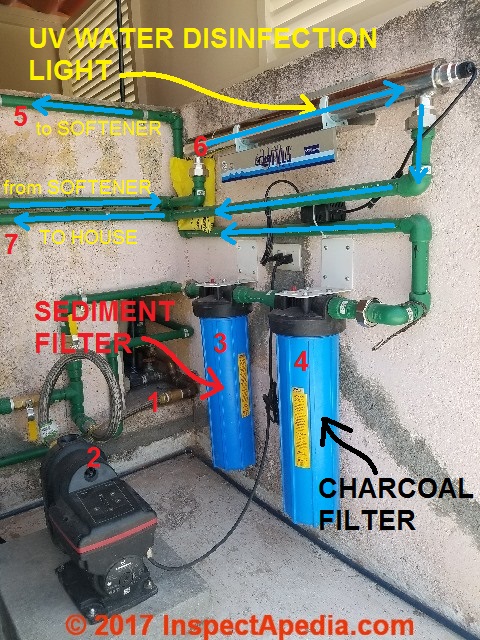 Advice for pre-filtering sediment to catch the coarse particles
Advice for pre-filtering sediment to catch the coarse particles
2015/11/09 Mark Plessinger said:
Hi. My girlfriends house has a well and an in line filtration system that uses a cleanable reusable filter. It clogs up about once every two months or so, sometime more frequent than that.
I noticed that most of the sediment is sand and soil. What I would like to do is install a second filter that would be a coarse filter - sort of a pre-filter that would trap the sand/soil and leave the current filter in place.
I see that most filter units are of the 25 um type but I would like to have recommendations on a coarse filter type. I would like to keep using a reusable type filter cartridge. I look forward to your comments.
Moderator reply
Mark,
Certainly we often see a cascade of filters at a water supply system just for the reason you cite - efficiency and econonmy.
I would take a water sample (ahead of the filters) to a local testing lab to see what you are drinking. They can then give you better advice about just the right sort of filter; at the same time you can confirm the presence or absence of bacterial or other hazards. For example if there is a lot of iron in the water you might choose a different pre-filter.
If the crud is simply coarse soil particles you'd choose a smaller simpler sediment filter than if the crud includes ultra-fine particles. The ultra-fiines clog up a filter pretty quickly so we install one that's physically larger.
Here's a first-class design that we read about at rainbrothers a company that sells filtration equipment: install filters in this order as water passes towards the water pressure tank from the well:
- A sediment "wye" filter.
This is a plumbing pipe wye that includes a simple coarse screen that catches the big particles; the wye can be opened and the screen removed for washing on a frequency that you will discover by observation. I'd start by checking it no less than monthly. The screen is a stainless steel high-micron (100u) screen that is simply washed off and re-inserted into the wye.
A Rainbird™ inline WYE filter with a 200 mesh screen is (shown below) sold online at prices between $20. and $30. U.S.D. I've put the WYE filter in the position you'd install it on a horizontal water line; be sure to respect the water flow direction (red arrow) - you'll see a directional arrow cast into the plastic body of the fitting.
To clean the Wye filter you turn off water, drop system pressure, put on a bathing suit, and unscrew the cleanout cap - or have your girlfriend do this chore.
- A coarse 30u cartridge filter -
these two first steps may be sufficient for your purposes but read my caveats above and below and have the water tested. - An intermediate 5u filter,
typically this is activated charcoal - If needed, an ultra-fine 0.5u cartridge filter.
This stage is needed for water systems sending up very fine sediment into the system.
Watch out: though they're very good filters, charcoal filters also are a happy breeding ground for bacteria.
Change the filters regularly (again by objective data of watching water flow rates and inspection) and be sure that you are confident that the water supply has no bacterial contaminants.
If necessary you can install a chlorinator (ahead of these filters or certainly ahead of the charcoal filter) to protect both the water supply and the life of the charcoal filter;
Adding kudos and a citation to rainbrothers who had particularly helpful advice on this topic:
- "Sediment Filtration", Rainbrothers Co, 1137 W. Broad Street, Columbus, Ohio 43222, Tel: 614.725.4363 Email: info@rainbrothers.com, retrieved 11/9/2015 original source www.rainbrothers.com/sediment_filtration.html
Brands of Water Filters used for Drinking Water Treatment
Above at WATER FILTERS, HOME USE we discuss the installation and use of water filters on private water supply systems, a portion of our
review of WATER TREATMENT EQUIPMENT CHOICES .
Also see WATER ODORS, CAUSE CURE .
Just below we provide the most comprehensive list of water filter and replacement water filter cartridge brands we have been able to find. CONTACT us to add to this list. These water filter products are available from building suppliers, plumbing suppliers, hardware stores, and on-line.
Watch out: when purchasing a water filter system for home use check to assure that it has been certified to comply with NSF / ANSI Standard 53 Reduction Claims for Drinking Water Treatment Systems. Keep in mind that most water filters are not intended to address biological hazards such as bacteria.
Where combinations of hazards are present, such as bacteria, chemical contaminants, and sediment, a combination of filters and water disinfection or treatment may be required. Consult a professional before installing a water treatment, filtering, or purification system.
Tests for Water Filter End of Life
Water filter "end of life" means that the water filter no longer effectively removes the contaminant substance for which it was rated or that the water filter has become so clogged that it significantly reduces water flow rate through the plumbing system.
Water filter "life testing" to determine how much water a filter an deliver is properly done by an independent, certified testing laboratory who has no financial relationship with sellers of the products that are being tested. Here are some resources for water filter testing:
- Aqua Veritas Micro Water Filter Quality Association, Tel: 561-373-3193 Email: info@aquaveritas.org Website: https://aquaveritas.org/ Mailing address: not provided
- Asher, JEffrey, Shyyue Liu, Yiyue Zhang, Jhanel Chew, Susan Murcott, HOUSEHOLD WATER FILTER EVALUATION Suitability Report [PDF] (2015) MIT Massachusetts Institute of Technology
Comprehensive Initiative on Technology Evaluation retrieved 2019/11/13 original source:
http://ceisip.mit.edu/system/files/reports/Household%20Water%20Filter%20Evaluation%20%E2%80%94%20Suitability%20Consumer%20Reports.pdf - NSF International P.O.Box 130140 Ann Arbor,MI 48113-0140 877-8-NSF-HELP; (877) 867-3435 www.nsf.org info@nsf.org
- Underwriter’s Laboratories,Inc. 333 Pfingsten Road Northbrook,IN 60062-2096 (877) 854-3577 www.UL.com/water mail to:water@us.ul.com
- US EPA Point-of-Use or Point-of-Entry Treatment Options for
Small Drinking Water
Systems [PDF] (2006) retrieved 2019/11/13 original source: https://www.epa.gov/sites/production/files/2015-09/documents/guide_smallsystems_pou-poe_june6-2006.pdf
Excerpt:
This document provides public water systems and States with the Environmental Protection Agency’s (EPA’s) current policy on point-of-use and point-of-entry devices used for compliance. The statutory provisions and EPA regulations presented in this document contain legally binding requirements.
This document is not a regulation itself, nor does it change or substitute for those provisions and regulations. Thus, it does not impose legally binding requirements on EPA, States, or public water systems. This guidance does not confer legal rights or impose legal obligations upon any member of the public. - US EPA Requirements for Filtered Public Water Systems [PDF] retrieved 2019/11/13 original source: https://www.epa.gov/sites/production/files/documents/SWTR_Fact_Sheet.pdf
- US EPA Microbiological Water Purifier Standards require removal of 99.9999% of Bacteria,
99.99% of Virus,
99.9% Cryptosporidium / Giardia
EPA WATER FILTRATION FACTS [PDF] (2005) EPA Water Health Series, retrieved 2019/11/13 original source: https://www.epa.gov/sites/production/files/2015-11/documents/2005_11_17_faq_fs_healthseries_filtration.pdf
Note: The EPA standards are voluntary. - Water Quality Association 4151 Naperville Road Lisle,IL 60632-3696 (630) 505-0160 www.wqa.org info@mail.wqa.org
- WHO, TOTAL DISSOLVED SOLIDS in DRINKING WATER [PDF] WHO/SDE/WSH/03.04/16, Background document for development of WHO Guidelines for Drinking-water Quality, retrieved 2021/11/09 original source: https://www.who.int/water_sanitation_health/dwq/chemicals/tds.pdf
- 2019/11/13: justin tripp said: We have a patent pending test kit for end of service analysis for water filtration systems @ www.chemsee.com we also test for heavy contaminants of dangerous heavy metals. enter JTD for 10% off on all sales.
posted originallyat CHECK VALVE FAQs by the reader:
Complete List of Water Filter Manufacturers
American Plumber Replacement Filters American Plumber Filters
AmeriFlow Replacement Filters AmeriFlow Water Filters
Ametek Replacement Filters Ametek Water Filters
Amtrol RO Tank Amtrol RO Tanks
Amway Replacement Filters Amway Water Filters
APEC Replacement Filters APEC Water Filters
AQA Total Replacement Filters AQA Total Filters
Aqua Cleer Good Water Machine Replacement Filters Aqua Cleer Water Filters
Aqua Flo Replacement Filters Aqua Flo Water Filters
Aqua Fresh Replacement Filters Aqua Fresh Water Filters
Aqua FX Replacement Filters Aqua FX Water Filters
Aqua Guard Replacement Filters Aqua Guard Water Filters
Aqua Pure water filter assembly & filters - 3M [2] AP11T, AP101T, AP14T, AP102T whole house water filter
AquaSoft Replacement Filters Aqua Soft Water Filters
Aqua Sun International Replacement Filters Aqua Sun Int'l Filters
AquaSystems Replacement Filters Aqua Systems Water Filters
Aquacheck Replacement Filters Aquacheck Water Filters
Aquafine UltraViolet Sterilizer Systems Aquafine UV Sterilizers
Aquagenic Replacement Filters Aquagenics Water Filters
Aquamaster Replacement Filters Aquamaster Water Filters
Aqua Pure Replacement Filters AquaPure Water Filters
Aquasana Replacement Filters Aquasana Water Filters
AquaSky RO Tank AquaSky RO Tanks
Aquatec RO Pumps Aquatec Pumps
Aquathin Replacement Filters Aquathin Water Filters
AquaWizard Replacement Filters AquaWizard Water Filters
Aries Replacement Filters Aries Water Filters
Arrowhead Replacement Filters Arrowhead Water Filters
Atlantic Filters Atlantic Filters
Avantapure Replacement Filters Avantapure Water Filters
Avian Replacement Filters Avian Water Filters
Barnstead Replacement Filters Barnstead Lab Filters
BestWater by Shaklee Replacement Filters BestWater by Shaklee
BioMaster Replacement Filters BioMaster Water Filters
Bosch Replacement Filters Bosch Water Filters
Brita Replacement Filters Brita Water Filters
Bruner Replacement Filters Bruner Water Filters
Bunn Replacement Filters Bunn Water Filters
Calgon Carbon GAC Calgon Carbon
Campbell Replacement Filters Campbell Water Filters
Challenger Replacement Filters Challenger Water Filters
Clack Replacement Filters Clack Water Filters
Clean World Waters (CWW) Replacement Filters Clean World Waters Filters
Coleman Replacement Filters Coleman Water Filters
Coralife Replacement Filters Coralife Filters
Cornelius Replacement Filters Cornelius Water Filters
Everpure Costguard Replacement Filters Costguard by Everpure
Crane Environmental Replacement Filters Crane Environmental Filters
Crystal Quest Replacement Filters Crystal Quest Water Filters
Culligan Replacement Filters Culligan Water Filters
CUNO Replacement Filters CUNO Water Filters
CUNO Food Service Replacement Filters CUNO Food Service
CUNO Water Factory Systems CUNO Water Factory
Everpure Replacement Filters Everpure Water Filters
Filterite Replacement Filters Filterite Water Filters
Flotec Replacement Filters Flotec Water Filters
Frigidaire Replacement Filters Frigidaire Water Filters
Fulflo Replacement Filters Fulflo Water Filters
GE Replacement Filters GE Water Filters
Honeywell Replacement Filters Honeywell Water Filters
Hytrex Replacement Filters Hytrex Water Filters
Innova Replacement Filters Innova Water Filters
InstaPure Replacement Filters Instapure Water Filters
JennAir Replacement Filters Jenn-Air Water Filters
Katadyn Replacement Filters Katadyn Water Filters
Kenmore Replacement Filters Kenmore Water Filters
Keystone Replacement Filters Keystone Water Filters
KitchenAid Replacement Filters KitchenAid Water Filters
Kinetico Water Systems Water Filters, softeners, etc. - https://www.kinetico.com/
KleenPlus Replacement Filters KleenPlus Water Filters
KX Matrix Replacement Filters KX Matrikx Water Filters
LG Replacement Filters LG Water Filters
Master Plumber Replacement Filters MasterPlumber Filters
Maytag Replacement Filters Maytag Water Filters
Omni Replacement Filters Omni Water Filters
Omnipure Replacement Filters Omnipure Water Filters
Parker Hannifin Replacement Filters Parker Hannifin Filters
Perfect Water Technologies, water filters, RO systems, etc.
Pentek Replacement Filters Pentek Water Filters
Plymouth Products Replacement Filters Plymouth Products Filters
Pollenex Replacement Filters Pollenex Water Filters
PUR Replacement Filters PUR Water Filters
Rainbrothers Co, 1137 W. Broad Street, Columbus, Ohio 43222, Tel: 614.725.4363 Email: info@rainbrothers.com
Samsung Replacement Filters Samsung Water Filters
Sears Replacement Filters Sears Water Filters
Sta-Rite Replacement Filters Sta-Rite Water Filters
Teledyne Replacement Filters Teledyne Water Filters
Town and Country Replacement Filters Town and Country Filters
True Value Replacement Filters TrueValue Water Filters
US Filter Replacement Filters US Filter Water Filters
Waterpik Replacement Filters Waterpik Water Filters
Waterway Replacement Filters Waterway Water Filters
Whirlpool Replacement Filters Whirlpool Water Filters
Readers concerned with water purity or water potability should also
see FILTERS for DRINKING WATER PURIFICATION for a discussion of portable and emergency water filters that are designed to purify drinking water, including portable ceramic water filters, silver ceramic filters, magnetic (bogus) water purifiers, paper and polypropylene water filters, etc.
See WATER TREATMENT EQUIPMENT CHOICES for details on other water treatment options besides filters.
...
Reader Comments, Questions & Answers About The Article Above
Below you will find questions and answers previously posted on this page at its page bottom reader comment box.
Reader Q&A - also see RECOMMENDED ARTICLES & FAQs
Question: how do I change my water filter cartridge if I can't un-screw the canister holder?
Friend of the editor wrote: Replacing our Tenectico water filter
I have tried to get two plumbers to replace this filter. They don’t call me back.
I went through the steps but don’t have the muscle (or maybe knowledge), or just plain confidence to loosen the filter housing.
Our water is slowing down, some spitting and some knocking. This filter was supposed to be replaced annually. it’s been five years on this filter!!.
Okay, I should have tackled this a long time ago. . - Anonymous by private email 2021/04/30
Moderator reply:
Thanks for a helpful question. Please find your question along with our detailed reply now at
Reader Question: how do I find a water filter that can withstand my house water pressure range?
I need to buy whole house water filter with max pressure 20-100 psi .
I do not know my home psi.
How can i know that filter will withstand my home pressure or not.
We had water pump applied in our mail home pipe system because water flow is weak.
Reply:
Walaa
It would be very unusual for a home water system pressure to exceed 70-80 psi and unusual for a home water filter to be unable to withstand that pressure range. As an example,
Perfect Water Technologies installation instructions for their systems may specify that there is a *minimum* water pressure of 40 psi for proper operation of some systems such as reverse osmosis, while looking at the company's simplest home water filter, their HMF 1C installation instructions, you will see these instructions:
- Feed water: PSI 20-90 PSI;
- For pressure greater than 90 PSI install a pressure regulator set to 75 PSI
- Feed water Temperature: 40̊-100̊ deg F
Frankly you should never see home water pressure operating over 75 psi - as higher pressures make for leaks and risk other damage.
It is quite easy to measure your home water pressure both static (when no water is running) and dynamic (when water is turned on at one or more fixtures) by using a home-made or store-bought water pressure gauge.
See WATER PRESSURE MEASUREMENT
- Hayes, Tom, and Dan Arthur. "Overview of emerging produced water treatment technologies." In 11th Annual International Petroleum Conference, Albuquerque, NM. 2004.
- Madaeni, S. S. "The application of membrane technology for water disinfection." Water Research 33, no. 2 (1999): 301-308.
- Ødegaard, Hallvard, Bjørnar Eikebrokk, and Ragnar Storhaug. "Processes for the removal of humic substances from water—an overview based on Norwegian experiences." Water science and technology 40, no. 9 (1999): 37-46.
- Perfect Water Technologies, "Home Master® Water Filter Installatin & Service Manual", Perfect Water Technologies, 7701 E. Gray Rd. Suite 104, Scottsdale, AZ 85260, Tel: 1-877-693-7873, Email: support@theperfectwater.com, Website: https://www.theperfectwater.com, retrieved 4/22/14, original source: http://www.theperfectwater.com/files/instructions/HMF-install-v2.pdf
- Richards, Bryce S., and Andrea I. Schäfer. "Photovoltaic-powered desalination system for remote Australian communities." Renewable Energy 28, no. 13 (2003): 2013-2022.
- Watson, B. M., and C. D. Hornburg. "Low-energy membrane nanofiltration for removal of color, organics and hardness from drinking water supplies." Desalination 72, no. 1 (1989): 11-22.
- Xu, Pei, and Jörg E. Drewes. "Viability of nanofiltration and ultra-low pressure reverse osmosis membranes for multi-beneficial use of methane produced water." Separation and purification technology 52, no. 1 (2006): 67-76.
Question: high-iron water in Nevada
(June 15, 2015) Judie Smith said:
we have a well. we are in north west nevada. the well water is very high in iron and other things. we changed the water filter and it seemed to clear the water up. the next day the water pressure was way down. it came back up on it's own. it did it again but seemed to fix itself. until today. now we have no pressure. we have taken the new filter out and cleaned it with no results. the pump is working. what is wrong.
Reply:
I don't know, Judie. Perhaps iron crud has clogged a pressure control switch sensor port. If the pump is not running I'd start there. If the pump runs then I'd be looking for loss of water in the well itself or a foot valve or strainer or pump impeller problem.
(June 15, 2015) Anonymous said:
thank you for your quick answer. it seems to have started with the filter change so we are starting there. i thought it needed priming after changing the filter but my friend says it only needs priming if there is a problem with the pump. the pump seems to be working fine.
Reply:
I agree with your friend.
If your water system pressure gauge shows pressure and/or the pump runs then the problem may be that during filter canister installation someone left a valve shut that should have been re-opened. Look for a shutoff or bypass valve in the wrong position.
If the filter system was already in place and just the filter element was replaced then try taking the new one out for a test to see if water flow returns.
Question: tightness of water filter cartridge connections
June 23, 2015) Kim Claybound said:
How are tight connections made to the top and bottom of the cartridge in a typical house water sediment filter (which is nominally 2-1/2" diameter by 10" high)? I ask for two reasons:
First, I've used several models of cartridge whose lengths are short of the nominal 10" length by as much as 1/4", yet I am told by an expert that I don't need to add shims (o-rings or washers). The cartridge slides into place with little or no resistance.
Also my filter, whose head has Bypass, Off and Filter positions, acts as if it's being bypassed although the head is in Filter position. The filter is roughly 40 years old. Is failure at that age reasonable?
Reply:
Kim
The sediment filter top and bottom slip over a protrusion in the water filter cartridge against which the filter will be tightened properly once you screw the canister top or bottom in place. But I share your concern about "short" filters that might be sold by a third party vendor.
I suspect that even 1/4" may be OK as the filter swells slightly when wet and as the canister protrusions extend about 1/2 inch into the cartridge. But it should be easy to see if the filter is leaking: you'll see debris coming through the system.
If your filter head is acting as if it's being bypassed you'll see that showing up as absence of visible flow of water through the filter, lack of accumulation of sediment on the filter exterior after a few days of use, or debris showing up in the water supply. It's possible that an O ring or seal in the filter head has failed. I'd replace the unit.
Question: lightning strike shorted the pressure control, now water is dirty
(July 24, 2015) Anonymous said:
A couple weeks ago, we had a lightning strike and long story short, it shorted out the pressure control switch and got it replaced. Anyway, since then our whole house water filter has been getting VERY dirty within 24 hours of replacement. We usually could go 5 months or so without replacing it. Any solutions?
Reply:
Before offering a solution let's diagnose the cause of the trouble. A lightning strike could also have damaged a well casing; if the casing is split or damaged not just dirt but other contaminants could be leaking into the well. I'd ask for help from a local well service company to see if they can find th dirt source rather than just adding a better filter.
Question: best way to get rid of high iron or magnesium content in water
(Aug 6, 2015) PRIYANKA SENGUPTA said:
I have low water pressure & high iron content,what U would u suggest me to buy, bacterial contamination is not prominent,i mean I am a budding microbiologist and we don't hv any fecal contamination..which type of filter would be ideal for us?
Reply:
Priyanka
This article contains the information you want WATER FILTERS - SEDIMENT & IRON
Also see this PDF file: www.inspectapedia.com/water/Iron_Manganese_RemoveNDSU.pdf
Question: impact of clogged water filter on pump and tank life
(Oct 6, 2015) Anonymous said:
I bought a house recently and was told the whole house filter had been changed a month before I bought it. I knew the bladder pressure tank was old and would have to be replaced sometime soon. My water pressure became worse and worse over the next two months.
When I went to change out the filter it had obviously not been changed for a long time. My question is: If a filter is not changed out and the well pump is trying to pump against that resistance, can it decrease the life of the well pump or damage it?
Reply:
My OPINION is that ultimately the pump life can be affected by a clogged water filter; with modest pressure resistance of a partly-clogged filter the pump has simply to run a bit longer to reach the cut-out pressure and you're probably operating within its heat and duty cycle design range.
But if the pump starts to run for very long intervals (hours for example) then you may overheat it and reduce its life.
On 2014-09-11 by Darrell - it is more common than you think for the water pressure in a house to exceed 75 psi.
As a licensed Master Plumber, it is more common than you think for the water pressure in a house to exceed 75 psi. This condition is due to the fact that pressure reducing vales or "pressure regulators," which every home is required to have to reduce the water pressure coming in from street, fail.
In over 50% of the homes I go into, these valves have worn out. I have seen water pressure inside reach pressures of 160 psi.
These valves wear out over time and they all eventually fail. A homeowner should check the water pressure inside the house yearly, by putting a gauge on the drain valve of the water heater. Gauges cost about $17.00 and can be purchased at any Home Depot.
On 2014-09-12 by (mod) - master plumber says often water pressure is too high
Thanks for your opinion Darrell. I agree that if a pressure regulator has failed a home may see higher than anticipated water pressure.
I'd be careful about being too confident about your 50% failure rate. Too often, because we tend to notice the exceptions, we think we're seeing something more often than we can. I was challenged on this by Aronstein when I claimed a very high number (say 50%) for percentage of homes with rust-damaged electrical panels.
In response to his challenge we did a study of several hundred homes and found that the number was nowhere near my impression, but it *was* true that it was a higher number than the electrical industry had dreamed.
You can see the result of that study at
https://inspectapedia.com/electric/HolmConf.htm
I also agree with you that checking water pressure with an independent gauge is a great idea.
See
https://inspectapedia.com/water/Water_Pressure_Measure.htm
for our detailed suggestion on buying or making an inexpensive water pressure test gauge.
Thanks again Darrell.
Daniel
On 2014-02-05 by Anonymous - what do entrada and salida mean on my water softener filter drawing?
https://inspectapedia.com/water/Water_Filter110-DJFcs.jpg
What is "Entrada" "Salida", in the drwaing at the link above?
Is that some kind of disease?
On 2014-02-05 - by (mod) -
Entrada is Spanish for Entrance
Salida is Spanish for Exit
On 2012-12-07 by Anonymous - local excavation caused dirt in our well water
The well we have was running clear water until someone had a idea that he needed to take a reservor out of the ground close to the well. Is this causing dirty water when the ground is very saturated with rain.
On 2012-10-24 by Kathleen Christy
We had a well drilled to 470 feet, 2 types caseing was used. At first the water was crystal clear, then in a few days pumped muddy, would clear some, pump muddy again. This had been going on since Aug 2012.
Could there be a leak in the casing? We are diffently not low on water. How should this be tested? We do have a whole house filter on currently and this has to be changed every 2 to 3 days to keep from clogging.
On 2013-03-18 - by (mod) -
Anon and Kathleen:
Your well casing should be sealed against surface water entry - or do you have a shallow well or dug well? If so it's just about impossible to keep the well sanitary.
If the well casing is peforated or damaged it may be repairable by inserting a well sleeve. Have the casing inspected by a company who has a well bore inspection camera.
On 2012-03-13 by Anonymous - this is one of the best sites on the internet. maybe it should get linked with wikiapedia.
this is one of the best sites on the internet. maybe it should get linked with wikiapedia.
Thanks a whole bunch!
On 2012-03-13 by (mod)
Thank you for your generous remark. We're told that Wikipedia has over 40,000 reference links to InspectApedia.com.
We also very much welcome reader criticism, content suggestions, or corrections - making our information ever better for everyone. Daniel.
...
Continue reading at WATER FILTER CARTRIDGE CHANGE PROCEDURE or select a topic from the closely-related articles below, or see the complete ARTICLE INDEX .
Or see WATER FILTERS, HOME USE FAQs - questions & answers posted originally on this page
Or see these
Recommended Articles
- WATER FILTERS, HOME USE - topic home
- CERAMIC FILTERS for WATER DISINFECTION
- CHLORINATORS & CHARCOAL FILTERS
- DRINKING WATER EMERGENCY PURIFICATION
- GIARDIA in DRINKING WATER
- REVERSE OSMOSIS WATER TREATMENT
- UV ULTRAVIOLET LIGHT WATER TREATMENT REPAIR
- WATER FILTER CARTRIDGE CHANGE PROCEDURE - how to put in a new filter cartridge
- WATER FILTERS - SEDIMENT & IRON
- WATER QUALITY & QUANTITY San Miguel de Allende
- WATER TREATMENT EQUIPMENT CHOICES - home
Suggested citation for this web page
WATER FILTERS, HOME USE at InspectApedia.com - online encyclopedia of building & environmental inspection, testing, diagnosis, repair, & problem prevention advice.
Or see this
INDEX to RELATED ARTICLES: ARTICLE INDEX to WATER TREATMENT SYSTEMS
Or use the SEARCH BOX found below to Ask a Question or Search InspectApedia
Ask a Question or Search InspectApedia
Try the search box just below, or if you prefer, post a question or comment in the Comments box below and we will respond promptly.
Search the InspectApedia website
Note: appearance of your Comment below may be delayed: if your comment contains an image, photograph, web link, or text that looks to the software as if it might be a web link, your posting will appear after it has been approved by a moderator. Apologies for the delay.
Only one image can be added per comment but you can post as many comments, and therefore images, as you like.
You will not receive a notification when a response to your question has been posted.
Please bookmark this page to make it easy for you to check back for our response.
IF above you see "Comment Form is loading comments..." then COMMENT BOX - countable.ca / bawkbox.com IS NOT WORKING.
In any case you are welcome to send an email directly to us at InspectApedia.com at editor@inspectApedia.com
We'll reply to you directly. Please help us help you by noting, in your email, the URL of the InspectApedia page where you wanted to comment.
Citations & References
In addition to any citations in the article above, a full list is available on request.
- NSF / ANSI 53 - 2015, "Drinking Water Treatment Units Health Effects", NSF or ANSI, ANSI Customer Service contact information: Email: info@ansi.org Phone: 212.642.4900, 212.642.4980 from 8:30 a.m. to 6:00 p.m. EST, Monday - Friday Mailing Address: ANSI Attn: Customer Service Department 25 W 43rd Street, 4th Floor New York, NY, 10036, webstore.ansi.org/RecordDetail.aspx?sku=NSF%2FANSI+53-2015
- NSF/ANSI 58 - 2015, "Reverse osmosis drinking water treatment systems", http://webstore.ansi.org/RecordDetail.aspx?sku=NSF%2FANSI+58-2015, obtained through the contact information given in the citation just above.
- In addition to citations & references found in this article, see the research citations given at the end of the related articles found at our suggested
CONTINUE READING or RECOMMENDED ARTICLES.
- Carson, Dunlop & Associates Ltd., 120 Carlton Street Suite 407, Toronto ON M5A 4K2. Tel: (416) 964-9415 1-800-268-7070 Email: info@carsondunlop.com. Alan Carson is a past president of ASHI, the American Society of Home Inspectors.
Thanks to Alan Carson and Bob Dunlop, for permission for InspectAPedia to use text excerpts from The HOME REFERENCE BOOK - the Encyclopedia of Homes and to use illustrations from The ILLUSTRATED HOME .
Carson Dunlop Associates provides extensive home inspection education and report writing material. In gratitude we provide links to tsome Carson Dunlop Associates products and services.


